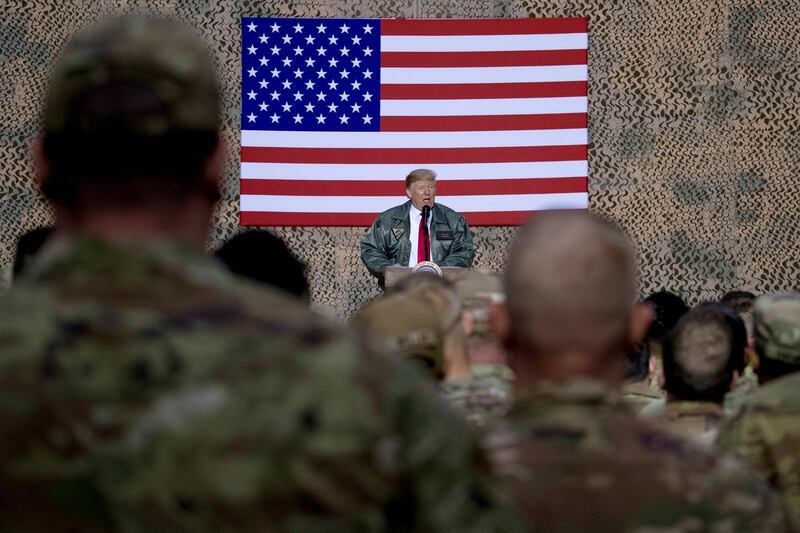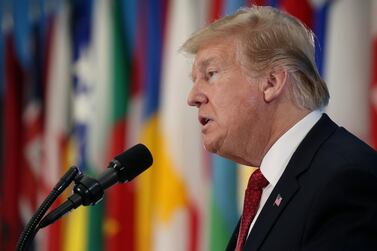US President Donald Trump’s mistreatment of Iraq has put at risk Washington's influence in Baghdad and given rise to the possibility of American troops being removed from the country, experts say.
Relations between the two states have grown tense after Mr Trump's unannounced visit to Al Asad airbase in western Iraq and his failure to meet Iraqi officials in December, as well as his recent declaration that forces stationed there will keep an eye on Iran.
Mr Trump's actions have pushed lawmakers to call for a draft bill to expel the US military presence, seen by some as an "occupying" force.
Nearly 16 years after the US invasion of Iraq, there remains about 5,000 US troops stationed in the country.
Yet, the discourse in Iraq remains that Mr Trump cannot decide on whether or not he wants to keep troops in the country, Renad Mansour, research fellow at London's Chatham House, told The National.
“This has been the unifying feature in many parliamentary debates,” he said.
Both the Binaa bloc, a pro-Iranian faction comprised of armed groups, and Islah, headed by the alliance led by populist cleric Moqtada Sadr, who champions the country's independence, have vowed to oust US troops.
Their unification portrayed a rare glimpse of harmony between Iraq’s two biggest rival blocs.
Balancing Tehran and Washington
Despite these efforts, officials in Baghdad have been faced with the daunting task of balancing ties between two of its most important allies, Washington and Tehran.
Iraq’s new cabinet has attempted to avoid being in the middle of the tussle, Prime Minister Adel Abdul Mahdi has been seen as a compromiser between the two.
He is a critic of both Iran and the US.
As a result, a domestic struggle has formed over who controls the new government and the US military presence is becoming a political football used in this internal struggle, Michael Knights, a senior fellow at the Washington Institute for Near East Policy, told The National.
Iraqi President Barham Salih and many other politicians denounced Mr Trump’s plan for US troops to “watch” Iran in an interview with CBS News last week, while others have called for the revision of its role in the country.
“If the anti-US block introduces a legislation to limit numbers of US troops, it will become more difficult for pro groups to protect it,” Mr Knights said.
Iranian influence
Mr Trump said that he wants to maintain a military presence in Iraq to keep an eye on Iran because “Iran is the real problem”.
He reiterated that the US has spent a fortune on Al Asad base, an asset that Washington should hold on to. But the US has said its military role in Iraq is to only counter ISIS.
Although Baghdad declared victory over the insurgents in December 2017, American presence remains unpopular.
Washington believes that keeping troops in Iraq is a necessity to preserve stability and cohesion of the Iraqi state, Amir Handjani, senior fellow at the Atlantic Council, told The National.
“The American forces serve as something akin to a guard rail. Of course from there is the added benefit of watching over Iran – but that is overblown,” Mr Handjani said.
But the US will have to play its cards very carefully because any more mistakes will further hurt the weighing influence that it has in the country, according to experts.
“Within the White House there is a group of leaders with a Middle East strategy that has been anti-Iranian, so they are hoping to use Iraq as a base for their efforts,” Mr Mansour said.
This is perceived as an issue for Iraqi officials who are attempting to re-establish the country’s sovereignty.
“Although there has been a massive anti-Iranian movement in Iraq, it doesn’t mean that they want to work with America on that end,” Mr Mansour said.
The US president’s behaviour has provoked frustration even among Washington’s allies in Baghdad.
Legality
While Mr Trump’s statement indicated his willingness for US troops to stay in Iraq, it is not necessarily the case that it will have any tangible impact.
It is actually the prime minister who has the authority to make that decision, and not other Iraqi politicians.
"It is a problem mainly because the prime minister is so weak and also because he has expressly stated repeatedly that 'there are no foreign military bases in Iraq,' just foreign trainers," Kirk Sowell, an expert on Iraq, told The National.
The angry rhetoric is mainly coming from political factions with militia wings, and not from any kind of popular protests mobilised by Iraqi citizens.
“If the prime minister holds firm, any bill passed by parliament can just be ignored,” Mr Sowell said.
From a legal perspective, parliament is supposed to approve "international agreements," he said.
Mr Abdul Mahdi has said that there is no status of forces agreement (Sofa) between Baghdad and Washington and their agreement is only based on the training of troops.






